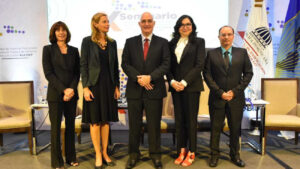The Dominican Republic is hosting the X Seminar of the Network of National Public Investment Systems of Latin America and the Caribbean with the participation of authorities from 16 countries of the region and international organizations.
The seminar, which takes place on November 3 and 4, will be attended by public investment directors from Chile, Uruguay, Nicaragua, Ecuador, Paraguay, Guatemala, Costa Rica, Panama, Honduras, Brazil, Bolivia, Peru, Mexico, Colombia, Argentina and the Dominican Republic. In addition, there will be special guests from Guyana and Trinidad and Tobago, as well as experts from the Inter-American Development Bank (IDB), the Economic Commission for Latin America and the Caribbean (ECLAC) and the German Society for International Cooperation (GIZ).
At the opening of the activity, the Minister of Economy, Planning and Development, Pável Isa Contreras, described the Network of National Public Investment Systems of Latin America and the Caribbean (SNIP Network) as a great space for exchange and learning, which has great potential to build more robust national public investment systems.
The economist and researcher highlighted the importance of identifying and strengthening investment aligned to the Sustainable Development Goals (SDGs) and that it contributes to climate change adaptation and mitigation.
“A dream we have in the Dominican Republic is how the National Public Investment System can take the country’s infrastructure to a new level, how we can raise the standards of all sectors and territories,” expressed the Minister.
Francisco Tula Martínez, president of the SNIP Network and general director of Public Investment of Costa Rica, highlighted the role of the National Public Investment Systems (SNIP) in revitalizing economic growth and development, as well as in improving people’s quality of life, strengthening risk management and combating climate change.
Maike Friedrichsen, German Ambassador to the Dominican Republic, highlighted the role of the general directorates of public investment as guardians of the quality of the proposed projects and guarantors of their relevance, social efficiency and resilience.
Katharina Folkner-Olmedo, IDB Group representative in the DR, indicated that the issues of efficiency, effectiveness and sustainability are currently urgent for governments and their ways of investing on a day-to-day basis, a task in which SNIPs are fundamental.
“National public investment systems are key actors in ensuring that public investment responds to the priorities set out in strategic planning and public policies,” added Cielo Morales, director of ECLAC’s Institute for Economic and Social Planning (ILPES).
About the SNIP Network and the seminar
The SNIP Network was created to strengthen the functioning of these state systems. It is currently made up of SNIP directors from 16 countries in the region and is supported by ILPES/ECLAC, the IDB and GIZ.
Among the topics to be covered in the seminar’s dialogue are the challenges to promote quality and resilient post-pandemic public investment, challenges to strengthen the institutional framework of public investment management systems, recent advances in the use of technologies for public investment management, promotion of resilient and sustainable infrastructure through SNIPs, and disaster risk management and climate action through public investment.
SNIPs are formed by the set of state institutions involved in the public investment process in the countries.
They develop methodologies, standards and procedures to guide the formulation, execution and evaluation of investment projects and their role is essential to ensure that the quality of public investment contributes effectively to the economic and social development of nations and is a means of implementing the Sustainable Development Goals in the budgetary-financial field.
This seminar, which is being held for the first time in person after the COVID-19 pandemic and more than 10 years after the creation of the SNIP Network, seeks to be an instance of reunion between the countries of Latin America and the Caribbean.
It is a space to discuss today’s complex challenges, especially the need to execute quality investments from a sustainability point of view, and to meet the growing expectations of generating public services in an environment of fiscal restriction and new or increased disaster risks associated with climate change.
This edition also seeks to reflect on how to take advantage of new technologies and develop capacities, always seeking to modernize the institutional framework for investment management.
Learn More: ECONOMY

